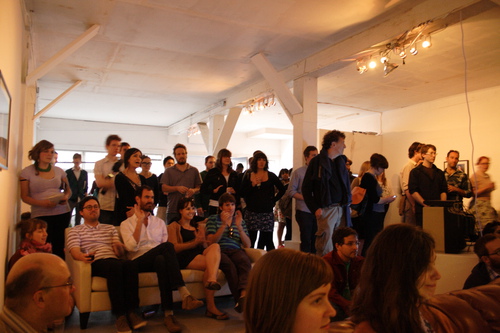As an undergraduate I worked for a well-regarded independent bookstore, now defunct (sigh…), that hosted readings and events a few times every week. Academics, local poets, major literary lights, the rare celebrity slinging a hardcover memoir—over the course of my three years’ employment I sat in on every manner of ‘appearance.’ I say appearance, rather than reading, because the reading portion of the evening (voice and text and presence and performance) seemed if not beside the point then certainly a second-tier attraction. People came to gawk or moon, they came to get their galleys signed or to soak up the air conditioning. They came for the Q & A. Oh, the Q & A! Those words still have the power to summon a pang of sympathetic terror in me, a sour feeling in my guts. As soon as the author closed her book I watched, as in the sudden swipe of frames thrown by a magic lantern, the quiet backroom of the bookstore changed into a shooting gallery. The author blinked and squawked, a lone duck. And me? I hunched over my little table readying the register, stacking and restacking books, fidgeting in order to avoid eye contact.
It will surprise no one then when I say I feel strongly opposed to readings. That’s a funny way to put it but I mean exactly that: I am against them. At least…I though I was. Something has shifted, and although deep inside I still very much averse to readings, they make me feel a physical disgust, approximately as intense as my reaction to shellfish (I’m allergic) and large moths (don’t ask), and yet lately I’ve found myself attending and—the crucial point—enjoying readings for the first time since high school, which makes me think that either I’ve changed or the readings have or both.
Well, OK, the readings have definitely changed. The readings I attended as an undergraduate took place inside the bookstore or, on special occasions, inside an amphitheater or a lecture hall. Fluorescent lights and stale, recycled air, poorly upholstered chairs fixed to the floor, a tinny PA system. Nowadays the readings are in galleries or someone’s living room, the spaces are intimate, warm or cold depending on the season, more often cramped than empty. The readers are reckless, they have nothing to lose but the affection of the audience. Everybody’s drinking, not a lot, but just enough to raise the stakes when a new reader takes the stage and fumbles with the microphone. There is a feeling—and I’m groaning inwardly at this phrasing but it’s the truth—of special community among the readers and the audience, an elective and participatory joy. Unlike most of the formal and academic readings I’ve attended there is a strong sense of intentionality, and presumably no one’s been forced or fooled into attending. No extra credit is at stake, and there will be no Q & A, unless of course you take the reader for a beer.
Increasingly, the readings I attend in Portland seem to be part of a larger conversation between writers, artists and performers, many of whom are cut off (either by choice or by accident) from the resources that we normally associate with universities and residency programs. Despite the fact that there is no prominent, top-tier university in Portland, a lot of talented young writers move to town soon after finishing an MFA or Ph.D. (they move here because it’s cheap, it’s liberal, and I swear to you it really is full of that eager-earnest DIY spirit, that ethos which makes Portland an easy target for satire, cf: Portlandia). And because there is no academic infrastructure to support, say, visiting readers, or writers-in-residence, the artists and poets who live here have to hustle in order to keep a series lively. The best reading series in the city, Bad Blood, is technically “occasional,” meaning that the organizers put it on only when they can book someone they are interested in. This makes a Bad Blood reading somewhat magical, an unlikely success, which of course is the sweetest kind of success. Another Portland series, called If Not For Kidnap, which takes place in the living room and kitchen of a cozy craftsman-style house, has become a kind of monthly salon for many of the local writers and artists that I admire. My monthly dose of Kidnap or Bad Blood is serious soul-medicine, a necessary counterpoint to the solitary nuts-and-bolts work of real writing. The community that has solidified around Kidnap is making better work, and more of it, because the nurtures new ideas, collaborations and experiments. This seems to me an invaluable service. And in this way I guess that I’ve changed as well. As an undergrad, and until recently, I never felt “involved” in the readings. My body filled some space inside the room, my mind wandered in and out of the reading, and that was it. Now I feel like I’m a part of something organic and exciting and valuable. The poetry and prose is great, the crowd is sensitive and smart, and the night never, ever concludes with a Q & A.


